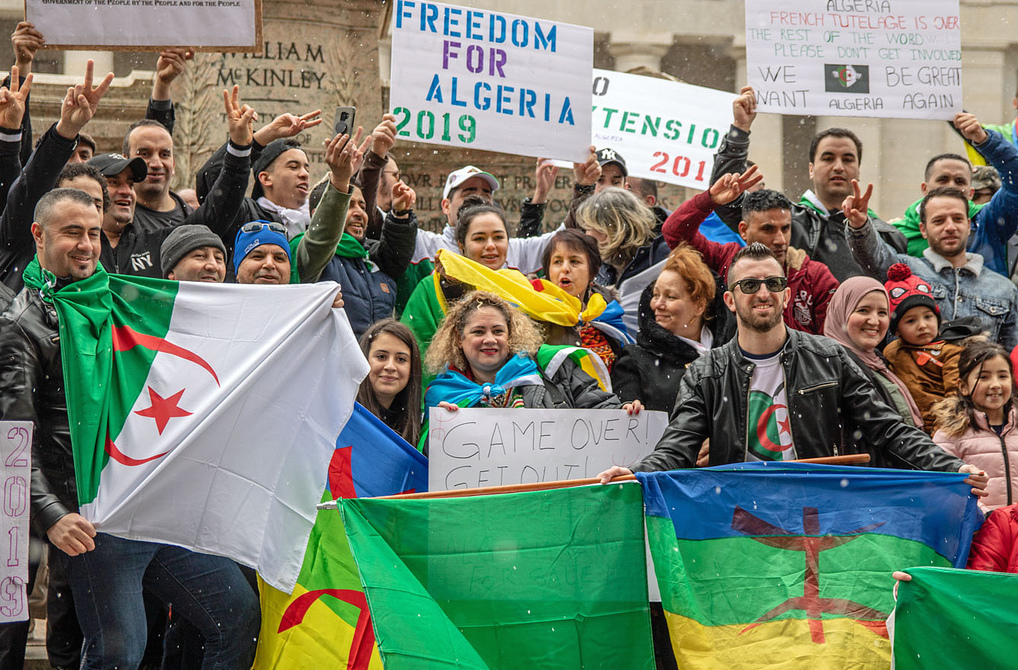A political uprising in Algeria has caught the attention of much of the world. Massive street demonstrations have succeeded in forcing ailing President Abdelaziz Bouteflika to withdraw his candidacy for re-election. What has not been settled is when he will step down, and what will happen next.
The 82-year-old president suffered a stroke in 2013 and has not spoken in public since 2014. While his campaign for a fifth term was underway, Bouteflika was getting medical treatment in Switzerland. Though he is back in Algeria, there is much speculation about the current state of his health.
Elections are scheduled for April 18. Demonstrators want assurances that Bouteflika will leave office when his current term ends on that date.
In his March 11 statement withdrawing his candidacy, Bouteflika indicated a national conference was needed before setting a date for new presidential elections. This was widely interpreted as a ruse by the president to hold onto power for at least the rest of the year.
It remains to be seen if elections will be as scheduled but it appears unlikely. Having a committee of “sages” set up an interim government and form a constituent assembly to draft a new constitution is a viable option — so long as it does not have the imprint of Bouteflika.
The oligarchy around the president and “the process” it has used to govern Algeria have been discredited by the democratic protests. The army has distanced itself from the regime but remains a powerful political force.
For some 130 years Algeria was ruled by France. Post-Napoleonic ambitions for territory on the other side of the Mediterranean led France to annex the country in 1842, carve up the land, and send colonizers to occupy it.
Of the 20th-century anti-colonial movements, the eight-year (1954-62) armed struggle in Algeria was one of the most violent and troubled.
Franz Fanon, drawing on the Algerian revolution (which he witnessed as a psychiatrist treating French soldiers involved as torturers), wrote The Wretched of the Earth, giving the world one of the most powerful accounts of the impact of colonization on the human spirit.
The Fourth French Republic ended in 1958, when Charles de Gaulle took power, promising to restore order after military force deployed under the French Socialists had failed to quell the uprising for Algerian independence.
A de Gaulle-led Fifth Republic government negotiated the 1962 Evian Accords with the Provisional Government of the Algerian Republic established by the National Liberation Front (FLN) revolutionaries. De Gaulle then initiated a referendum vote that formally ended French rule and provoked a revolt within the French army by the Secret Army Organization (OAS).
The anti-imperialist forces in Algeria coalesced around the FLN, which established one-party rule after independence.
Subsequent FLN-inspired governments built the Algerian secular nationalist model: socialization of resources, redistribution of revenues, import substitution industrialization, and urbanization through housing construction.
Algerians witnessed the gathering of power in fewer and fewer hands, but the population also experienced a widening of education — from 15 per cent literacy at independence from the French to 65 per cent (female) and 75 per cent (male) by 2000 — a rising standard of living and a population explosion.
Today the population of Algeria is over 42 million and one-half are under the age of 30. It is the youth of Algeria who have provided the energy and determination to carry the democracy movement into the streets, widening to include up to 4 million demonstrators on the last successive four Fridays.
Teachers, journalists, judges, lawyers, and the police have joined the demonstrators singing to one, two, three, Viva Algeria.
The demonstrations have been peaceful, with virtually no incidents of violence other than in the capital city of Algiers, and this in a country that throughout the 1990s was undergoing a vicious civil war.
The army entered politics to deny Islamist fundamentalists — winners of 1991 legislative elections — the right to govern, fearing they would turn Algeria into a theocracy.
It was in 1999 that Bouteflika, a former foreign minister who had been forced into exile, came back to take power with the backing of the army.
Regime stress in Algeria goes up when the price of oil goes down, as it did in 1998. There is no other source of external revenue other than oil and other resource revenue.
In response to difficulties providing employment for the growing population, Bouteflika modified the constitution by decree, taking more power.
Seeing him become virtually president-for-life prompted a group of women in central Algeria to mount a campaign to stop Bouteflika from seeking a fifth term in another rigged election. The demonstrations now take place in all the cities along the coast and throughout central Algeria.
Will the Algerian democracy movement, which invokes memories of the Arab Spring, its hopes, but also its failures to produce meaningful change, complete its task of replacing a dictatorship with an electoral regime?
Watching the crowds mass every Friday and seeing the support generated by the action in the streets, there is good reason to think Algerians will finish the job and overthrow the current regime.
Duncan Cameron is president emeritus of rabble.ca and writes a weekly column on politics and current affairs.
Photo: Becker1999/Flickr
Help make rabble sustainable. Please consider supporting our work with a monthly donation. Support rabble.ca today for as little as $1 per month!





